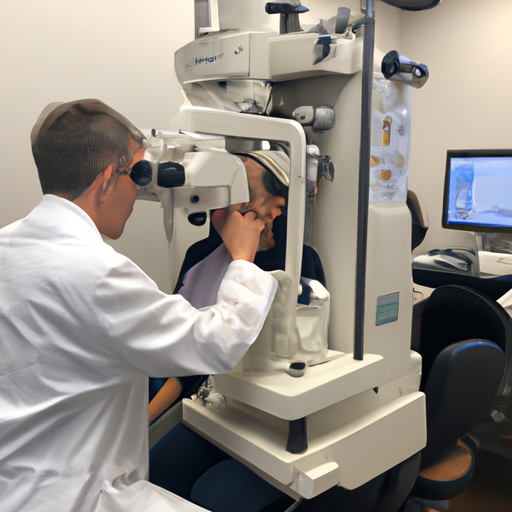Step foot into the world of vision care and begin to comprehend the importance of regular eye examinations in safeguarding not only your sight, but also your overall health. This article takes a closer look at why routine eye check-ups play such a significant role in maintaining optimal ocular health, with an emphasis on the services provided by Dr. Joseph Tegenkamp and the exceptional team at the 50 Dollar Eye Guy in Pensacola, Florida. You’ll get to know more about the high-quality care they’re passionate about providing, the extensive eye assessments they emphasize, their wide collection of trendy eyewear, and their top-tier customer service.
Understanding Eye Exams
What is an eye exam?
An eye exam is a comprehensive assessment of your eyes by an eye health professional, typically an optometrist or ophthalmologist. The exam includes a series of tests that evaluate both your visual acuity and eye health. The test comprehensively assesses essential aspects of vision, such as nearsightedness, farsightedness, astigmatism, and other eye conditions.
Types of eye exams
Eye exams can be broken down into two principal types: a vision screening and a comprehensive eye examination. Vision screenings are quick and basic checks, usually designed to identify any serious vision problems. On the other hand, a comprehensive eye exam involves an in-depth and detailed look at your eye health and is capable of spotting more subtle differences.
How often should you have an eye exam?
The frequency of eye exams can vary. Generally, adults should have an eye exam at least every two years whilst individuals with existing vision problems or at risk for eye disorders should have them more frequently.
The Importance of Regular Eye Exams
Early detection of vision problems
frequent eye exams are essential for early detection of various vision problems, such as refractive errors, strabismus, colorblindness, and amblyopia. Identifying these issues early can lead to better outcomes with prompt treatment.
Preserving eyesight
Prevention is always better than cure. Periodic eye exams can help detect early signs of conditions that could eventually lead to loss of vision. This has an added effect of preserving your eyesight through timely interventions.
Detecting other health issues
Eye exams do not only focus on your eyes. Other health issues, such as high blood pressure, diabetes, or even neurological conditions, can manifest signs in the eyes, thereby serving as a valuable tool in early detection.
How Eye Exams Contribute to Overall Health
Indications of systemic diseases
Systemic diseases, like high cholesterol, diabetes, or autoimmune disorders, often display symptoms in your eyes. Regular eye check-ups can detect these signs, facilitating timely diagnosis and treatment.
Assessing overall visual health
Eye exams do more than measure your sight; they’re a check-up for your overall visual health. They can uncover problems like dry eyes, binocular vision dysfunction, and other conditions that may cause discomfort or difficulties in daily life.
Checking for eye diseases
There’s also the aspect of checking for eye diseases. Glaucoma, macular degeneration, cataracts – these are just a few of the conditions that can be detected with regular eye exams, before they have a chance to seriously affect your vision.
The Utilization of Modern Technologies in Eye Exams
Machine-aided eye tests
Modern technology has positively influenced eye healthcare, leading to the development of machine-aided eye tests. These are efficient and accurate, allowing for better, more precise diagnosis and treatment.
Innovation in eye care
Innovation in eye care includes the advent of digital retinal imaging, corneal topography, optical coherence tomography, among others. These technologies allow professionals to thoroughly assess ocular health and respond effectively to detected issues.
What to Expect During an Eye Exam
Procedure and tests involved
During an eye exam, you can expect a variety of tests. These may include a vision test to determine how clear your vision is, tests to check for the presence of diseases, pressure tests to detect possible glaucoma, and surely an evaluation of your pupillary responses to light.
How long will it take?
An eye exam typically takes about an hour, give or take depending on the individual’s needs. Remember, it’s important to take ample time for these exams to ensure the accuracy of the results.
Preparation for an eye exam
Before your eye exam, it’s always a good idea to note any changes to your vision. It’s also helpful to bring your current glasses or contacts, along with any relevant family eye health history.
The Role of Optometrists in Conducting Eye Exams
Professional qualifications of optometrists
Optometrists are highly-qualified eye health professionals. They’re trained to diagnose, manage and treat various eye diseases and disorders. They can prescribe glasses and contact lenses, as well as provide pre- and post-surgical care.
What services do optometrists provide?
Optometrists provide a wide array of services, including vision testing, prescription for glasses or contact lenses, examination of the eye for diseases, and management of conditions like glaucoma, macular degeneration, and dry eye syndrome.
How Eye Exams Can Improve Your Quality of Life
Improves academic and work performance
Good vision is an essential requirement for optimal performance at work or in school. Regular eye exams ensure your vision remains at its best, thus proving beneficial for your overall productivity and efficiency.
Helps in maintaining safety especially in driving
Undeniably, clear vision is crucial for safe driving. Regular eye checks can keep your prescription up-to-date and help you stay safe on the road.
Pediatric Eye Exams and their Importance
When should children have their first eye exam?
Eye care professionals recommend that children’s first eye exam should be at six months of age. Identifying and correcting vision problems during childhood can have a profound impact on a child’s development.
How eye exams affect children’s learning
Children with untreated vision problems can experience difficulties in learning and social development. Eye exams play a crucial role in detecting issues early on, thereby promoting healthier and more effective learning experiences.
Preventing Vision Loss Through Regular Eye Exams
The importance of preventive eye care
Preventing eye disease before it begins is the underlying principle driving the importance of regular eye exams. It saves you from potential vision loss and benefits your overall eye health.
Conditions that can lead to vision loss
Several conditions can lead to vision loss, including glaucoma, macular degeneration, and uncontrolled diabetes. Regular eye exams can detect these early and provide the opportunity for early intervention and management.
The Role of the 50 Dollar Eye Guy in Providing Quality Eye Care
About Dr. Joseph Tegenkamp
At 50 Dollar Eye Guy, you can count on the expertise of Dr. Joseph Tegenkamp. He is committed to providing you with the best eye care services possible. His drive for quality patient care and the creation of a comfortable experience sets him apart.
The commitment of 50 Dollar Eye Guy to quality eye care
The 50 Dollar Eye Guy team is passionate about your eye health. They hold the belief that proper eye care involves a detailed examination to ensure a thorough understanding of your eye health and vision needs.
Services offered by 50 Dollar Eye Guy
50 Dollar Eye Guy provides a wide array of services, from comprehensive eye exams and fashionable eyewear. Their aim is to provide the best possible eye care experience for you. They pride themselves in delivering personalized care and adequate time for each patient, promising an unparalleled experience.




